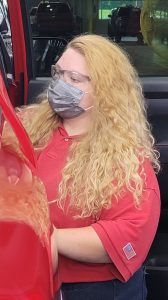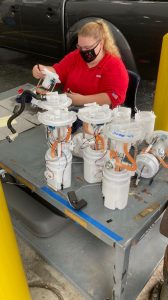
UM junior Emily Robinson, a co-op intern at Mississippi Nissan, inspects weather strips on a vehicle, ensuring they are fully seated on the body to reduce the risk of leaking before weather testing. Submitted photo
Emily Robinson is gaining lots of hands-on experience – thanks to both her on-campus education and a cooperative internship at Nissan in Canton.
Robinson, a junior mechanical engineering major at the University of Mississippi, said she was well prepared for her internship at Nissan through what she learned in UM’s Haley Barbour Center for Manufacturing Excellence.
“Many times when I had to fix a part issue, I needed to use heavy machinery like a lathe or milling machine,” she said. “Luckily, I already had experience on how to use those machines through the CME.
“When investigating part issues, I was better able to determine whether or not those issues were caused by the lack of 5S, which is a type of lean manufacturing methodology.”
Robinson said she was also able to use other knowledge she gained in the CME – such as process flow, takt time and cycle time – when traveling to suppliers.
“There is not a day that goes by where I have not used something that I learned from the CME,” Robinson said.
Getting the Job
During the first semester of her sophomore year at Ole Miss, the Madison native applied for a co-op internship at Nissan to be a parts quality engineer. In her role, the junior is responsible for the quality of the parts, mainly in the trim, chassis and final line areas. Over the course of her internship, Robinson has worked on two teams: current and new model.
Before entering Ole Miss, Robinson had attended the Madison Central High School Academy of Engineering.
“Our engineering academy advisory board contained sponsors from local companies, one of which is Nissan,” Robinson said. “I took interest in the automotive industry, so I got to know Nissan’s ambassador well.

Robinson works on fuel pump modules that come out of the fuel tanks. She was the only person in the plant who knew how to properly tear the modules down after the supplier had shown her the process a few days before. Submitted photo
“I believe that having my foot in the door was definitely a massive help to getting the job. I also had a resume that was filled with awards, certifications and real-world design projects that I had been a part of.
“Seeking out those opportunities made it much easier to stand out and gave me unique topics to talk about.”
Before her interview, Robinson also did some research on both Nissan and the automotive industry so that she was able to talk about those subjects effectively.
“Many interviewers want to know if you are going to fit in with where you work,” she said. “While being professional is important, so is being friendly and relatable.
“When it came to the questions that I had for them, I asked what they did, how they liked the job and other questions pertaining to them.”
Doing the Job
While working on the current model team, Robinson was stationed at the Titan and Frontier truck system line. The current model team is broken down into three separate teams of engineers: Just-In-Time (JIT) engineers, region engineers and window engineers. She was a window engineer.
“Every day, we are sent a report that contains all of the defects that our repair technicians reported the day before,” Robinson said. “Issues are then allocated among the team depending on the part and model.
“After it is handed over, we have full autonomy on how to identify root cause and create countermeasures to immediately be put in place.”
Robinson would first do a thorough investigation of the issue and determine if the defect was caused by the part or due to an operator, packaging or transportation. If the latter, it was her responsibility to hand the issue over to the correct department. If it was a part problem, she would immediately talk to either the regional or JIT engineer to contact the part’s supplier.
“We would then be able to work with the supplier to get the part within specifications either visually or dimensionally,” she said.
While working on the new model team, Robinson held the same responsibilities as she did on the current model team and then some.
“I had to do a receiving inspection on all of my parts before they were to be used in production, review and sign off on the packaging of parts,” she said. “I also had to travel to suppliers to verify their process, production rates and part quality.”
One of Robinson’s supervisors at Nissan said she has proven to be a valuable asset to plant operations.
“She has leader mentality, and (she) has shown this with her working with new interns as they come on board,” said John Wayne Smith, senior product quality engineer at Mississippi Nissan.
“It has been a pleasure working with her, and I have probably learned more from her than I was able to pass on to her. She has the potential to (be) an exceptional engineer.”
CME Preparation
While at the Madison Central High School Academy of Engineering, Robinson was exposed to many concepts that broadened her scope of engineering. The academy’s curriculum is composed of four main courses: Introduction to Engineering, Principles of Engineering, Digital Electronics and a senior capstone project.
During her senior year of high school, Robinson was tasked with finding a problem and using the design process to create a solution. An unfortunate incident the summer before provided her with a real-life scenario.
“My friends and I went on a vacation to a water park,” she said. “One of my friends is deaf and uses cochlear implants to be able to hear. In order for her to be able to hear the music and talk to us, she wore her cochlear implant with her waterproof case.”
Unfortunately, while going down a waterslide that connected to the lazy river, the implant fell off her ear, was swept into the river’s current, and could not be seen due to the white casing that blended in with the water. It was eventually found by someone who had stepped on the implant causing the case to open and exposing the electronics to water.
“It was $25,000 worth of damage,” Robinson said. “My team and I worked on innovating the case so that it would float in water and be more visible by using color all while still being water and debris proof. We researched patented designs, talked to audiologists, and even reached out to companies that could potentially help with prototyping.
“Since having done a senior capstone project before and having to work out all the kinks, I know that my capstone project for the CME is going to be far more efficient.”
Back to the CME
Just as school has prepared her for her internship, Robinson said that her internship has prepared her to go back to campus.
“While working at Nissan, I have significantly bettered my skills in communication, Excel, teamwork, managing time and people, being assertive, taking responsibility and not being afraid. Before I came to this internship, I always had the fear that I was not actually cut out for engineering due to my intellectual capacity and abilities,” she said.
“After this internship, there is very little that can convince me that this is not what I am supposed to be doing with my life,” she said. “I am now more driven than ever to get this degree so that I can pursue this career. No matter what struggles, obstacles and other setbacks that arise, I will think back on this year and remember what it’s worth.”